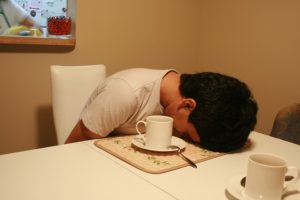When I got out of my Glideaway adjustable bed this morning, I headed straight to the kitchen to pour myself a steaming hot cup of joe. There is truly nothing so good as having a warm cup of coffee early in the morning and taking some time to reflect on the day you have ahead of you. For me, it has definitely become an essential part of my morning routine. I am always researching new types of coffee such as hawaiian coffee and Sicilian coffee beans to possibly try out. Early morning meetings are a task and what better to rely on than caffeine to help you kick-start a day.
It can be either a strong cup of Earl Gray tea or a coffee made by specially roasted beans ground to perfection (have a coffee delivery of a similar kind by clicking the link), we all have our own customs of caffeine consumption. Caffeine is a type of stimulant drug that promotes alertness and wakefulness, but you need to be careful as an overdose can have a detrimental impact on you!
Caffeine behaves as an opponent to the adenosine receptor. Adenosine is a hormone in the body that promotes sleep. Caffeine in coffee suppresses the adenosine receptor to keep you from falling asleep. It is the most consumed drug in the world. As per longstanding studies, 54 percent people in the world consume coffee and 43 percent consume tea. America, alone, accounts for 85 percent coffee consumption with average daily consumption of about 300 mg per person.
Is Coffee, a friend or a foe?
Coffee or caffeine is an effective alerting agent and stimulates the body’s nervous system along with an effect on the digestive and circulatory system. The most common and known effect is that of wakefulness. Besides, it also creates an ephemeral upshot in blood pressure levels. It boosts your mood, physical and mental performance during the day.
Furthermore, it may reduce the risk of cancer, type 2 diabetes, stroke, and depression, something that would have otherwise affected your life significantly. It is very likely that your health would be affected, and to the point of you wanting to organize a life insurance plan in the event that something were to happen to you. Of course, you can never be too prepared, and having a life insurance plan in place and asking yourself “Is life insurance for diabetics expensive?” and getting the necessary answers as soon as possible can help to give your family peace of mind when you are gone. That being said, these risks are reduced when you incorporate coffee into your life. Some evidence also indicates that caffeine may help protect against neurodegenerative diseases such as Parkinson’s and Alzheimer’s.
However, it should be noted that high doses of caffeine can negatively impact your body. The aftermath includes the following:
- Increased breathing rate
- Muscle tremors
- Diarrhea
- Nausea and sweating
- Heightened heart rate
People who reduce or stop their coffee intake are succumbed to (i) low energy levels, (ii) bad moods, (iii) headaches and even (iv) sleepiness. Further, coffee and sleep have an undesirable co-relation as the former reduces the quality and quantity of the latter.
Coffee and sleep
Image courtesy: www.flickr.com
According to a study published in Science Translation Medicine, a cup of coffee in the evening slowed down the circadian rhythm, the body’s internal clock, by delaying the production of sleep hormone melatonin by 40 minutes. The result – it’s difficult to snooze off.
The body has a natural sleep cycle. It is very important to understand this sleep cycle. It has two periodic phases of sleep – NREM (non-REM or non-rapid eye movement) and REM (rapid eye movement). At night, the body alters between these two phases. A hormone that is vital for growth and development is only released in the last stage of NREM sleep. Caffeine disturbs this sleep cycle.
The effect of caffeine on sleep
Human reaction to the effects of caffeine on sleep is variable. Many pieces of research have concluded that the impact of coffee on sleep is dependent on various factors such as sensitivity levels, age, time of consumption and genetic variability.
Related: 8 ways to handle your lack of sleep
Age and sensitivity
A few studies have evaluated the relationship between age and caffeine on sleep. A study was conducted on 22 young adults (20-30 years old) and 24 middle-aged adults (45-60 years). The study concluded that middle-aged adults are more sensitive to the effects of caffeine than younger adults. It showed that the middle-aged adults had reduced sleep period and poor sleep quality than young adults. Age and caffeine had an impact on their brains which resulted in superseding the daily natural indication to wake up and eventual fragmented sleep.[1]
Time of consumption
Some researchers propose that the impact of caffeine are less marked in those who drink coffee on a regular basis than those to drink coffee occasionally. Results from a survey published a couple of years ago inferred that sleep quality was bad in those who believed that they are dependent on caffeine in any form. It was also associated with a decrease in proper daytime functioning, poor sleep quality and high levels of disturbance during the night.
Genetic variability
Though there is less evidence in this area, research on genetic variability and effect of caffeine on sleep indicates that metabolism of caffeine and sensitivity to caffeine differs from person to person. More details on this topic are available elsewhere.
How much caffeine consumption is harmless?
Caffeine is harmless if its intake is moderated. It is noteworthy to remember that the source of caffeine can not only be coffee, but also tea, energy drinks, sodas, and chocolates. For a healthy adult, Food and Drug Administration (FDA) suggests that no more than 400 mg of caffeine a day is considered harmless. So 400 mg of caffeine would mean
- Four 8-ounce cups of coffee
- Two energy drinks
- Six 12-ounce sodas
Caffeine is not a foe if consumed thoughtfully, such that it does cause any damage to your normal sleep cycle. Those heavily dependent on coffee should scale back and track their intake amounts. The ones looking for mental stimulation should resort to a sunshine break rather than a coffee break. Natural light is a powerful stimulant whose exposure can increase productivity, elevate attention span and mood while upturning focus and energy.
[1] https://www.coffeeandhealth.org/topic-overview/caffeine-and-sleep/


